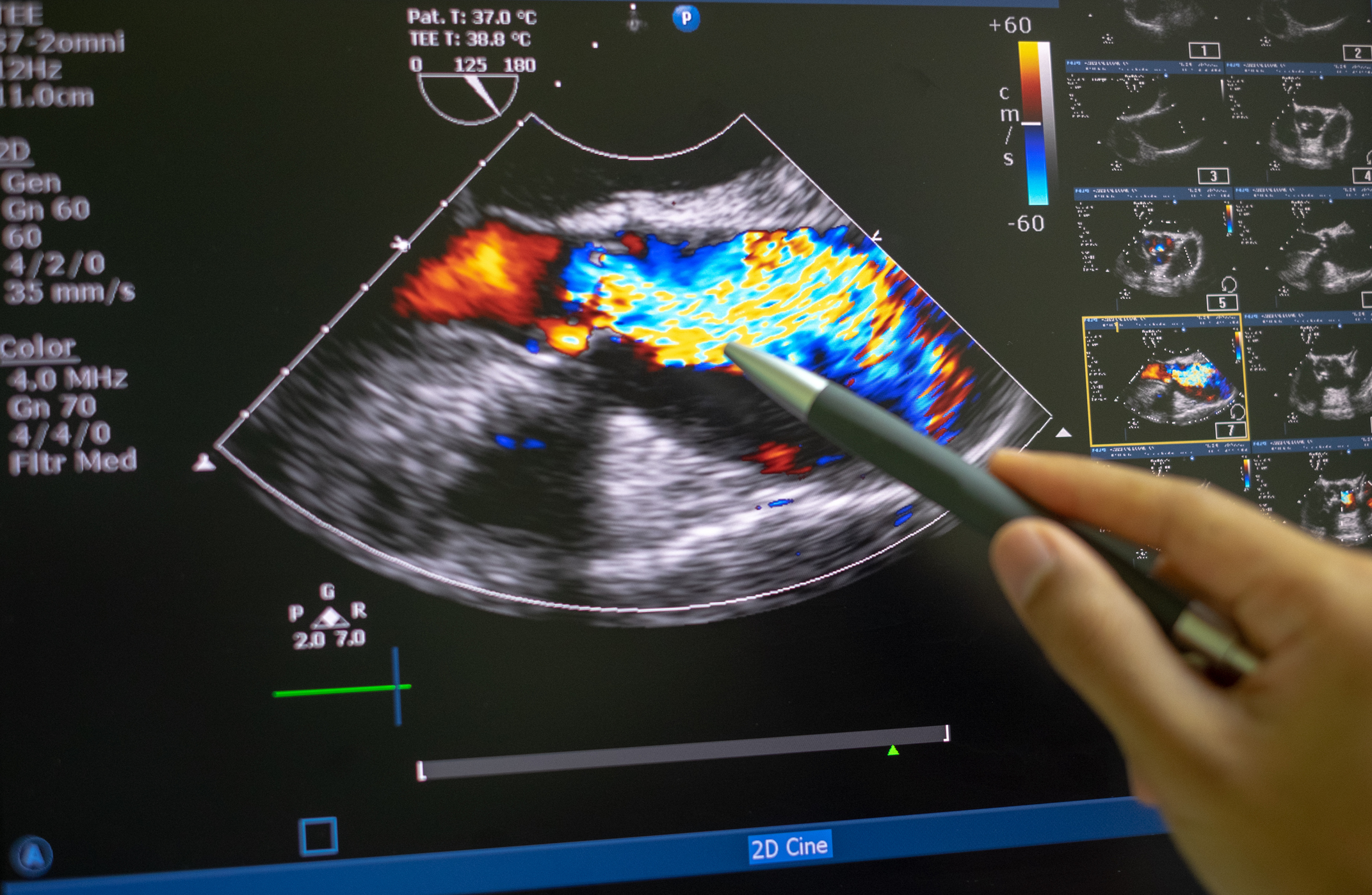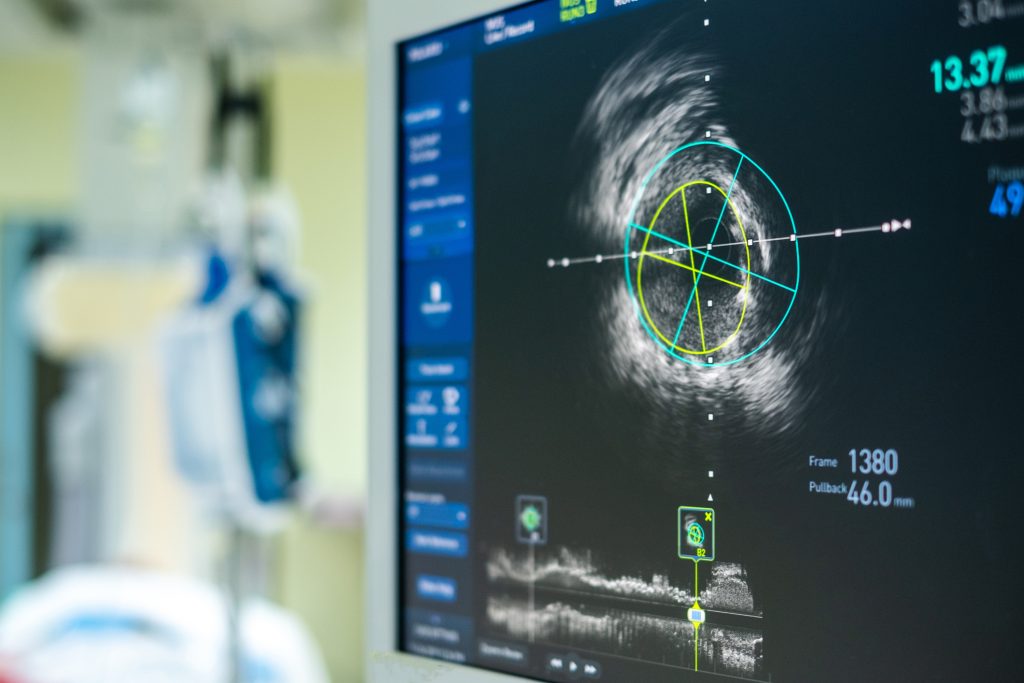The Centralized Echocardiography Analysis Laboratory (CoreLab)
The Echocardiographic Core Laboratory (ECL), founded in 2010, provides centralized third-party interpretation of echocardiographic studies for clinical trials worldwide. It collaborates as a research partner with clinical trial investigators and industry sponsors.
Specifically, the ECL offers echocardiographic measurements for clinical investigations and trials that use echocardiography for patient eligibility, study criteria, and endpoints.
Dr. Pibarot serves as the director of the Echocardiography Core Lab, leading a team of approximately twenty members including coordinators, internal auditors, echocardiography technicians, and certified cardiologists who are experts in echocardiographic analysis.
To date, they have analyzed over 30,000 echocardiograms from multiple studies worldwide, making the Echocardiographic Core Lab one of the most sought-after and recognized labs in the field of valvular and structural heart diseases.


CoreLab Managers

Isabelle Fortin
Chief Coordinator

Philippe Pibarot
Laboratory Director

Nancy Côté
Internal Auditor

Annie Lacombe
Coordinator
Other CoreLab Members :
- Internal Auditor Assistants : Philippe-Antoine Côté et Camille Ollivier.
- Assistants Coordinators : Yvette Parent et Martine Parent.
- Cardiologists : Mathieu Bernier, Jonathan Beaudoin, Mohamed-Salah Annabi, Ézequiel Guzzetti, Erwan Salaun, Iria Silva Conde, Pierre-Yves Turgeon, Amélie Paquin, Abdellaziz Dahou, Antonela Zanuttini, Haifa Mahjoub, Carlos Guiliani, Alexis Theron, Angela Lopez, Igor Morr, Benjamin Camacho, Rafael Jimenez, Alberto Alperi.
- Technologists in Echocardiography : Anne-Marie Doucet, Catherine Pichette, Mathieu Roux, Danielle Tardif, Élyse Morissette, Geneviève Cabana, Jenny Carrier, Linda Rouleau, Audrey Labelle.
Our Ongoing ELC Projects
– ACURATE IDE : Safety and Effectiveness Study of ACURATE Valve for Transcatheter Aortic Valve Replacement. To evaluate safety and effectiveness of the ACURATE Transfemoral Aortic Valve System for transcatheter aortic valve replacement (TAVR) in subjects with severe native aortic stenosis who are indicated for TAVR. https://clinicaltrials.gov/study/NCT03735667
– PARTNER 2 – SAPIEN 3 : PARTNER II Trial: Placement of AoRTic TraNscathetER Valves II – XT Intermediate and High Risk (PII A). The purpose of this trial is to determine the safety and effectiveness of the Edwards SAPIEN XT transcatheter heart valve and delivery systems which are intended for use in patients with symptomatic, calcific, severe aortic stenosis. https://clinicaltrials.gov/ct2/show/NCT01314313
– PARTNER 3 : PARTNER 3 Trial: Safety and Effectiveness of the SAPIEN 3 Transcatheter Heart Valve in Low Risk Patients With Aortic Stenosis (P3). To establish the safety and effectiveness ofthe Edwards SAPIEN 3 Transcatheter Heart Valve (THV) in patients with severe, calcific aortic stenosis who are at low operative risk for standard aortic valve replacement. https://clinicaltrials.gov/ct2/show/NCT02675114
– EARLY TAVR : Evaluation of TAVR Compared to Surveillance for Patients With Asymptomatic Severe Aortic Stenosis (EARLY TAVR). This study will evaluate the safety and effectiveness of the Edwards SAPIEN 3/SAPIEN 3 Ultra Transcatheter Heart Valve (THV) compared with clinical surveillance (CS) in asymptomatic patients with severe, calcific aortic stenosis. https://clinicaltrials.gov/ct2/show/NCT03042104
– TAVR UNLOAD : Transcatheter Aortic Valve Replacement to UNload the Left Ventricle in Patients With Advanced Heart Failure. The objective of this study is to determine the safety and efficacy of transcatheter aortic valve replacement (TAVR) via a transfemoral approach in HF patients with moderate AS as compared with OHFT. https://clinicaltrials.gov/ct2/show/NCT02661451
– V-WAVE : The V-Wave Shunt: FIM Safety and Feasibility Study (VW-SP-1). The V-Wave a trial-septal shunt implant is intended for the reduction of elevated left atrial filling pressures (‘Left Atrial Decompression’) in chronic, New York Heart Association (NYHA) class III -IV, Heart Failure (HF) patients. https://clinicaltrials.gov/study/NCT01965015
– BACE : Evaluation of Safety and Efficacy of the BACE™ Device in the Treatment of Functional Mitral Valve Regurgitation [FMR (BACE). The preclinical and clinical evidence of safety and efficacy with the BACE device (concept and feasibility) paved the way for the evaluation of the BACE device (Cardiac Phoenix) in this prospective, multi-center, single-arm, self-controlled study for safety and efficacy in the treatment of ffunctional MR in a maximum of 60 adult subjects. https://clinicaltrials.gov/study/NCT02701972
– LEAFLEX : The Leaflex™ Early Feasibility Study. A Prospective, Multicenter, Non-randomized, Single-arm, Open-label Clinical Study to Demonstrate the Safety and Performance of the Leaflex™ Performer in the treatment of patients with symptomatic, severe aortic stenosis. Subjects will be seen at pre- and post procedure, discharge, 30 days and at 3, 6, 9- and 12-months post procedure. https://clinicaltrials.gov/study/NCT04636073
– SHORTCUT : A Prospective, Multicenter, Non-Randomized, Single-Arm, Open-Label Clinical Study to Demonstrate the Safety and Effectiveness of the ShortCut™ Device (The ShortCut™ Study). https://www.clinicaltrials.gov/study/NCT04952909
– DISCORDANCE : Standardized Invasive Hemodynamics for Elevated Gradients Post TAVR (DISCORDANCE TAVR). This study will determine the discordance between echocardiography-derived and invasive transaortic gradients, as determined by a consistent and reproducible technique (Standardized Invasive Hemodynamics) post-TAVR. https://clinicaltrials.gov/study/NCT04827238
– BEST : Balloon-expandable vs Self-Expanding Transcatheter Heart Valve (BEST). It is a randomized which is evaluating the impact of transcatheter heart valve (THV) transplantation: Self-expanding/Auto-extensible (SE) versus Balloon-expandable/Extensible par ballon (BE) on the risk of all-cause mortality at 90 days and 1 year. https://clinicaltrials.gov/study/NCT05454150
– ALLIANCE : Safety and Effectiveness of the SAPIEN X4 Transcatheter Heart Valve. The objective of this study is to establish the safety and effectiveness of the Edwards SAPIEN X4 Transcatheter Heart Valve (THV) in subjects with symptomatic, severe, calcific aortic stenosis (AS). https://clinicaltrials.gov/study/NCT05172960
– PROGRESS : Management of Moderate Aortic Stenosis by Clinical Surveillance or Transcatheter Aortic Valve Replacement (PROGRESS). This study objective is to establish the safety and effectiveness of the Edwards SAPIEN 3 / SAPIEN 3 Ultra / SAPIEN 3 Ultra RESILIA Transcatheter Heart Valve systems in subjects with moderate, calcific aortic stenosis. https://clinicaltrials.gov/study/NCT04889872
– RHEIA : RHEIA (Randomized research in women All Comers With Aortic Stenosis). Purpose of this prospective, randomized, controlled, multi-center study is to evaluate the safety and efficacy of Transcatheter Aortic Valve Implantation (TAVI) as compared to surgical aortic valve replacement (SAVR) in female patients with severe symptomatic aortic stenosis. https://clinicaltrials.gov/study/NCT04160130
– RESILIENCE : RESILIENCE Trial: Evaluation of the Durability of Aortic Bioprostheses/Valves With RESILIA Tissue in Subjects Under 65. The objective of this observational trial is to determine time to valve failure due to valve deterioration requiring re-intervention and collect/investigate early potential predictors of valve durability (e.g., calcification and hemodynamic deterioration) in RESILIA tissue valves. https://clinicaltrials.gov/study/NCT03680040
– VSLING : Vsling™ III: Clinical Evaluation of the Vsling™ Device for Ventricular Repair in Patients With Heart Failure (Vsling III). Prospective, multi-center, open-label clinical study of the feasibility and initial safety and performance of the Vsling™ in patients with heart failure (HF) with evidence of reduced left ventricular ejection fraction, associated with ventricular dilation. https://clinicaltrials.gov/study/NCT06002386
– VIVA : CoreValve VIVA Study Evaluation of the Clinical Outcomes of CoreValve in Degenerative Surgical Aortic Bioprosthesis. This observational study is intended to collect real-world (post-approval use) data regarding the clinical utility and performance of the Medtronic CoreValve® System for Transcatheter Aortic Valve Implantation (TAVI). https://clinicaltrials.gov/study/NCT02209298
– LYTEN : Comparison of the Balloon-Expandable Edwards Valve and Self-Expandable CoreValve Evolut R or Evolut PRO System for the Treatment of Small, Severely Dysfunctional Surgical Aortic Bioprotheses. The ‘LYTEN’ Trial. The treatment with transcatheter aortic valve implantation (TAVI) of patients with small (≤23mm) surgical bioprostheses remains a challenge due to the increased transvalvular residual gradients and high rates of severe prosthesis-patient mismatch (PPM) following the procedure. https://clinicaltrials.gov/study/NCT03520101
Join The CoreLab !
You wish to get involved in our Echocardiography Analysis Laboratory
It's very simple! If you are an echocardiography technologist or a cardiologist, simply send us your CV to the following email address: nancy.cote@criucpq.ulaval.ca"
